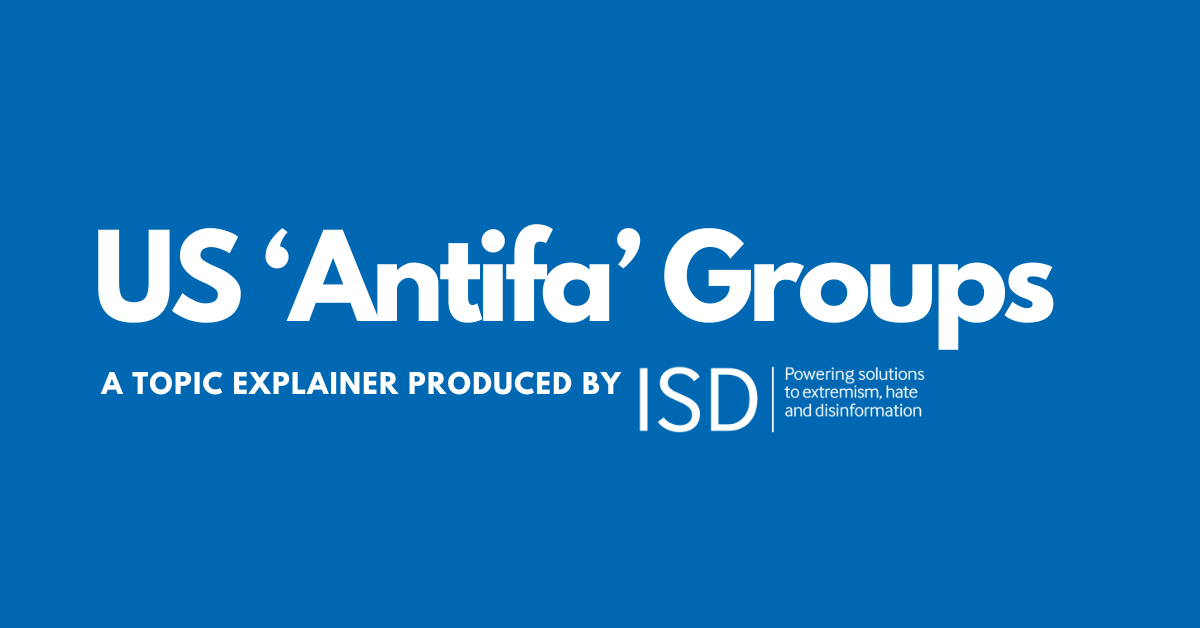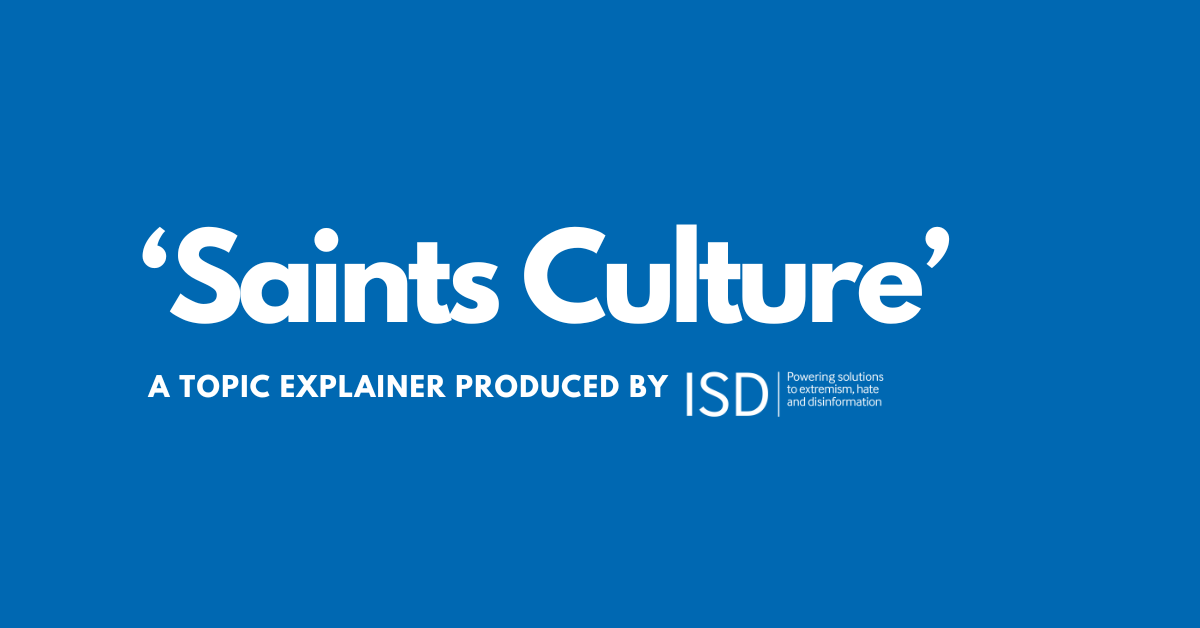The ‘Manosphere’
A downloadable version of this page can be accessed here.
The ‘manosphere’ is an umbrella term that refers to a number of interconnected misogynistic communities. It encompasses multiple types and severities of misogyny – from broader male supremacist discourse to men’s rights activism (MRA) and “involuntary celibates” (incels).
Background
What is it?
Simply put, the manosphere encompasses a range of misogynistic communities that vary from anti-feminism to more explicit, violent rhetoric towards women. This ISD Explainer explores the more extreme and divisive proponents of these online communities.
Tie-in with Extremism
Research by the Southern Poverty Law Center (SPLC) shows significant cross-pollination between the ‘manosphere’ and right-wing extremism. While affiliates of one may not explicitly identify as the other, there have been instances of graphic misogynistic content on right-wing extremist sites and references to right-wing extremist ideology in Incel forums. One prominent example of the former is The Daily Stormer and its founder, Andrew Anglin.
The Daily Stormer is a neo-Nazi, antisemitic site that also features dehumanizing discourse towards women and prides itself on being “the most censored publication in history”. This symbiosis of rhetoric is evident in quotes from Anglin’s articles that read “women are the Jews of gender” and that “women use their bodies like Jews use their Jew gold – as a manipulation tool to get what they want”. Here, Anglin employs antisemitic tropes to denigrate women, as Incels and other affiliates of the ‘manosphere’ do. The site is riddled with instances of such rhetoric.
High-profile instances of violence affiliated with the manosphere include:
⏩ Isla Vista, USA (2014) – Elliot Rodger injures fourteen and kills seven, including himself. Rodger self-identified as an incel and claimed a desire to enact revenge on women, as well as promoting other related anti-women narratives, in a series of YouTube videos and a “manifesto” he left behind.
⏩ Toronto, CA (2018) – After allegedly applauding Rodger on Facebook and posting that the “Incel rebellion” had begun, Alek Minassian kills ten and injures a further sixteen by driving a van through a busy business district of Toronto.
⏩ San Bernardino, USA (2020) – A men’s rights advocate who was allegedly a very visible member of the online MRA community is linked to two murders, one of which targeted a female judge but ended in the death of her son.
⏩ Toronto, CA (2020) – A seventeen-year-old male fatally stabs one and injures two at a massage parlor in Toronto. This was the first case of incel-affiliated violence in Canada to be treated as an act of terrorism.
Related Narratives
Incels: who are they and what do they believe?
Short for “involuntary celibates”, incel communities believe they are entitled to sex. Because they haven’t had sex recently or at all, they feel a bitterness or hatred towards women (most self-identified incels are men) and their own station in life. Incel forums are therefore rife with misogyny that ranges in severity from broader generalizations of women to pro-rape discourse.
While incel forums vary in terms of severity, the danger of the ideology is evident in the acts of Elliot Rodger and Alek Minassian, both of whom identified as incels. Rodger also left behind a graphic manifesto, in which he spoke of the need for concentration camps to exterminate women, with the exception of a select few that are kept for reproductive purposes. Rodger and Minassian are glorified by many users of incel forums. Some refer to Rodger as Saint Elliot or Supreme Gentleman Elliot Rodger and call for more men to replicate his actions.
Characterizations
The following names are used to characterize and generalize men and women into different “types”.
Alphas, Betas and Omegas – Alphas are men that are considered sexually “successful” and traditionally handsome, and are generally characterized as confident, assertive and dominant. Betas are normally ‘normies’ who can achieve sex but will never be able to prevent Stacy from sleeping with Chad.
Chads, Stacys, Beckys – Similarly to Alphas, Chads are considered the opposite of incels in that they are “successful” with women and “conventionally handsome”. Incels may refer to Chads in a mocking sense or with admiration.
Stacys are the female equivalent to Chads, but generally referred to more negatively than Chads are. Stacys are often characterized as beautiful, hyperfeminine but “dumb” and promiscuous. Incels believe Stacys will only go for Chads or “Alphas”. Beckys are considered less attractive than Stacys, but still unattainable for incels.
Dehumanization of Women:
One of the dangers of incels is their rhetoric about and attitude towards women.
Femoids or FHOs – Short for “female humanoids” or “female humanoid organism”, these terms are intended to dehumanize and belittle women not only as lesser than men, but as less than human.
AWALT – “All women are like that”, again used to generalize and stereotype.
Hypergamy – Taken from animal biology and inaccurately applied to women, hypergamy is the concept of “mating upwards”. Some incels believe women are hypergamous and therefore will always seek relationships with men of higher status than themselves, or than the men they are currently with.
Branch or vine-swinging – Tying in with hypergamy is the generalization of women as “branch-swinging” or “vine-swinging”, which essentially accuses women of always seeking “better” men and “swinging” from one relationship to the next for opportunistic reasons.
Men’s Rights Activism and Pick-Up Artists
It is difficult to draw a clear-cut line between incels, Men’s Rights Activists (MRA) and Pick-Up Artists (PUA). They all draw on the same underlying belief in male victimhood – specifically that women and feminism are at fault for the “lowly” status at which modern men find themselves. Incels, MRA and PUA communities may also borrow each other’s language and aspects of each other’s ideologies. That said, there are a few areas in which these movements diverge.
Pick-Up Artists (PUA)
PUAs compare to incel communities in that they feel men are owed sex and that women therefore need to be “sexually available” at all times. PUA was popularised by Neil Strauss’ ‘The Game’, and in contrast to the online-only incels has a significant in-person component in the form of seminars and training. As their name suggests, PUA communities focus on teaching their members how to manipulate women into sex. Arguably the most visible name within these communities is “Roosh V”, founder of the now defunct Return of Kings website.
The site is full of misogynistic discourse that claims a woman’s place is in the household and promotes a very toxic manifestation of masculinity. Derogatory, homophobic terms like “soy boy” and “faggot” are commonplace across the site, for example, while women and feminism are blamed for what is perceived to be an increasing intolerance towards men. The site also contains articles that mock rape and sexual consent, claiming for example that all girls have a rape story because it is how they compete with one another. Roosh V’s own site takes this further by proposing rape be legalized on private property, in which he writes “Let’s make rape legal. Less women will be raped because they won’t voluntarily drug themselves with booze and follow a strange man into a bedroom…”
Men’s Rights Activist (MRA)
MRA discourse is perhaps the most different from incels in that adherents do not define themselves by the status of their sex life or intimate relations with women. MRA rhetoric focuses much less on sex, instead criticizing gender equality, women’s rights, and women’s status in society more broadly. Specifically, MRA communities believe men are disadvantaged by feminism. Some take this further and believe women’s suffrage, women’s right to education and to a life in the public sphere rather than just domestic sphere have all contributed to a declining status and power of men in society, and should therefore be reversed.
In contrast to both Incel and PUA discourse, MRA movements generally make a more concerted effort to “formalize” their discourse by framing it within academic terms, thus adding a false sense of legitimacy to their claims. For example, A Voice for Men, one of the most visible MRA websites, claims its mission statement is to “provide education and encouragement to men and boys: to lift them above the din of misandry, to reject the unhealthy demands of gynocentrism in all its forms…”. While this seems harmless, the site is full of misogynistic content. In an audio recording on the site, for example, the site’s founder states that “p**** is the only real empowerment women will ever know”, that women rely on men for “accomplishment”, of which he lists creating technology, curing disease and more, and that the only influence women have over this is “p****”, effectively belittling women down to sexual objects.
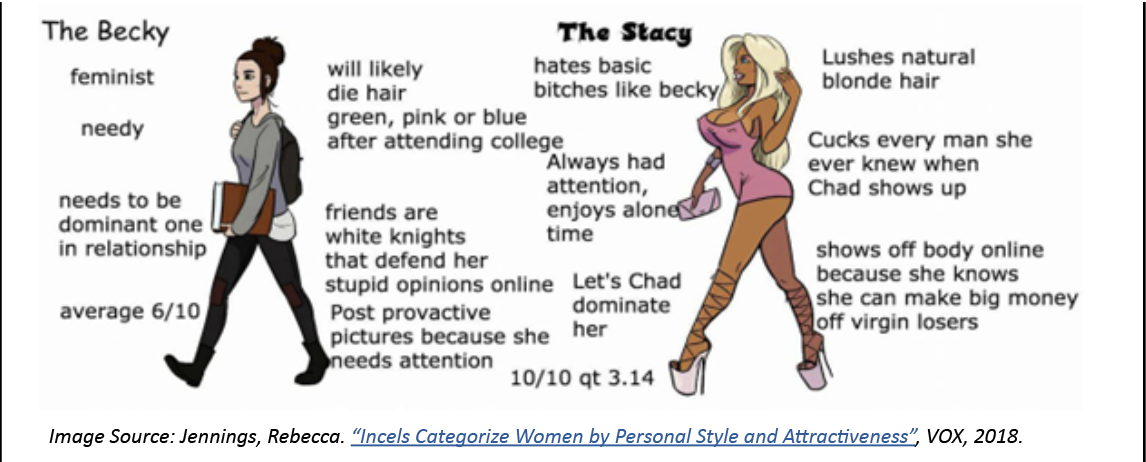
Gynocentrism
Merriam-Webster Dictionary defines “gynocentric” as “dominated by or emphasizing feminine interests or a feminine point of view”. MRA movements argue that society is gynocentric and therefore favors women over men. Female privilege is therefore seen as reality, whereas male privilege is seen as myth and a lie espoused by mainstream media and by feminists.
MRAs argue that gynocentrism is prevalent across all aspects of life, particularly in courts of law, which they accuse of favoring women especially in divorce or rape cases. Many MRA affiliates believe modern marriage is also gynocentric, in that it is burdensome on men financially and emotionally. That said, not all MRA affiliates are opposed to marriage so long as the husband-wife dynamic is ideologically appropriate. There are a number of articles on MRA sites on how to choose an appropriate wife, for example, and how to address and handle your marriage after you’ve been redpilled (see below).
Similarly to incels, MRA movements purport the idea that women are by nature hypergamous – they will always marry or mate “upwards”, with a man of higher status than themselves or the one they are currently with. MRAs argue that this is because of the gynocentric environment and society in which women have been raised.
The ‘Manosphere’ and Online Pills
Online forums, chat rooms and websites affiliated with incels, PUAs and MRAs are riddled with references to differently colored pills, each of which refers to a different level of exposure to and/or acceptance of what these groups deem to be reality. These metaphorical pills are inspired by The Matrix, in which the protagonist is offered a blue pill or a red pill, the latter of which will show him how the world really is. In this vein, affiliates of these different online communities refer to being “redpilled” as recognizing and embracing their worldview – their understanding of the world. “Pilling” language is also seen in right-wing extremist groups, further nodding to the overlap that exists between these ideologies. Importantly, however, given the popularity of the film that inspired this terminology, if an individual uses such language it does not necessarily mean they associate with the extremist movements that employ it. This language therefore needs to be understood in the broader context of how it is used and in what regard.
The Red Pill
The red pill is essentially an acceptance of the worldviews put forth by whatever individual or group that is using the term. In the context of the ‘manosphere’, therefore, the red pill is recognizing among others that feminism is harmful to men, that men are the victims of a gynocentric world, and, especially amongst incels and PUAs, that men are entitled to sex and that women should therefore be sexually available to them.
Importantly, the red pill is used not only to denote abidance by these narratives, but also as a call to action to further disseminate them. Many Incel forums and MRA websites now feature videos or threads about “how to redpill” others, especially women. Similarly, some sites directly call to its visitors to “take the redpill”, where the red pill is offered as an explanation for and solution to all the woes and ills of men, whether that’s unhappiness in marriage, unemployment, or low self-esteem. Finally, individuals that consider themselves “redpilled” may refer to those that aren’t as “normies” or as “bluepilled”, often derogatorily.
The Blue Pill
The blue pill sits opposite to the red pill. If you are bluepilled, you are considered to be ignorant of how the world really is. In other words, you don’t abide by the worldview put forth by those that consider themselves redpilled.
The Black Pill
The black pill is not as common across all components of the ‘manosphere’ as the red pill. Most notably, it is used by Incels to refer to hopelessness – that there is no way out of being an Incel. While both redpilled and blackpilled Incels are unhappy with being “involuntarily celibate”, those that identify as redpilled generally feel there are ways out of that status, while those that identify as blackpilled believe “that their situation is permanent and inescapable” (ADL).
Dissimilar to MRAs and PUAs, Incel forums are therefore often riddled with imagery and mentions of suicide, of LDAR (“lie down and rot”) or of “going ER”, in which ER refers to Elliot Rodger of the Isla Vista killings.
Other pill “types” (less commonly referred to)
Rape Pill – The rape pill is used exclusively amongst a subset of the Incel community (“rapecels”) that believe male-female sexual relations should always be decided by the man and that therefore female consent is not necessary.
Pink Pill – As noted by the ADL, “While many Incels argue that women by definition cannot be incels, since there will always be incels willing to sleep with women, femcels (female Incels) do make up a small subset of incel culture”. The pink pill is used by female incels essentially the same way the black pill is used by male incels – it is the belief that nothing will change their situation and they will never be considered desirable by men.
Affiliated Figures and Sites
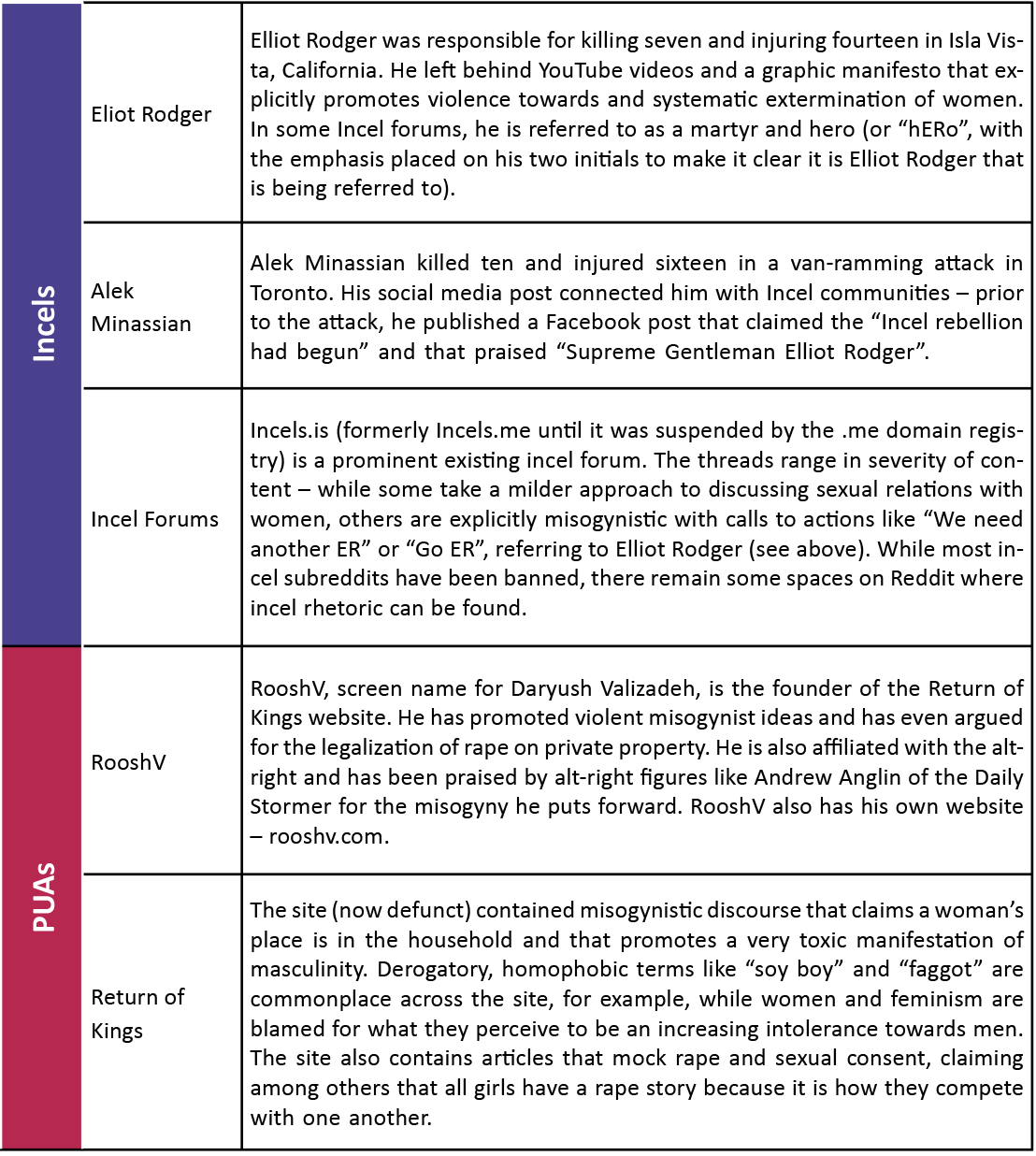
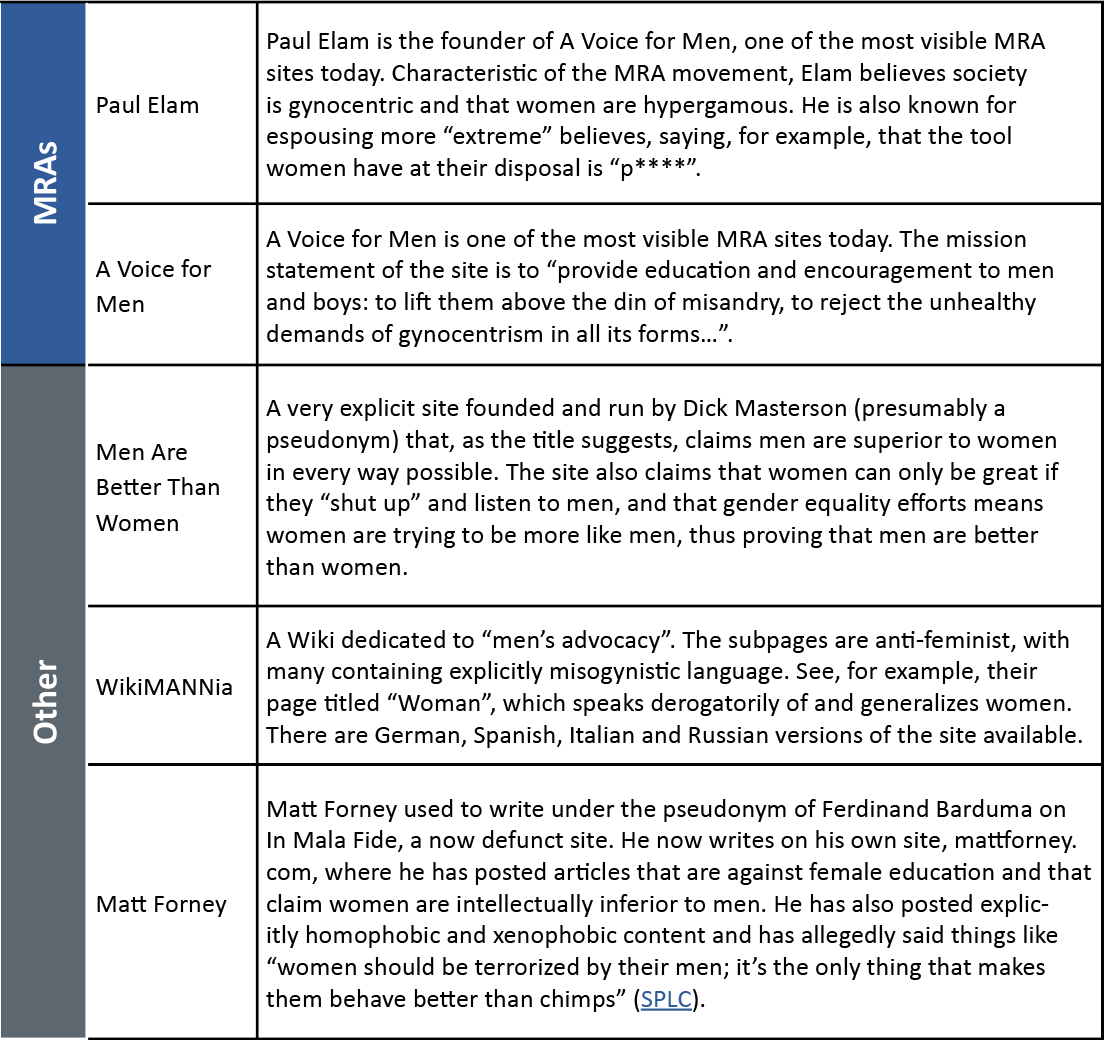
Further Reading
Male Supremacy – by the SPLC
A useful resource that describes various manifestations of extreme misogyny online, as well as providing quotes by leading affiliates of misogynist movements that demonstrate the harm and severity of the narratives they espouse.
Five Guides to Incels – Dr. Tim Squirrell. A series of useful and in-depth resources about incel communities.
Part One – Incelocalypse
Part Two – the A-Z Incel dictionary
Part Three – the history of the Incel
Part Four – why can’t everyone be blackpilled?
Part Five – why are Incels becoming more extreme?
The Intersection of Misogyny and White Supremacy – ADL
The Anti-Defamation League (ADL) explores the intersection and overlap between misogynistic communities online and white supremacy in a concise and useful summary that makes clear the harms posed by both.
The Extremist Medicine Cabinet: A Guide to Online “Pills” – ADL
Here, the ADL goes through the various types of pills that are referred to across misogynist and right-wing extremist communities online.
Men Who Hate Women – Laura Bates
In this book, Bates summarizes her experiences with embedding herself in online misogynistic communities, in turn exposing the severity of the content and narratives put forward by these communities. She covers incels, MGTOW (“Men Go Their Own Way” – a separatist movement of men that seek to end all formal and informal ties with women), PUAs and MRAs.
Inside the Men’s Rights Movement – Mother Jones
A deep-dive and historical look into prominent MRA figures Warren Farrell and Paul Elam.
_________________________________________________________________________________
Produced with support from ![]()
This Explainer was uploaded on 20 September 2022.

